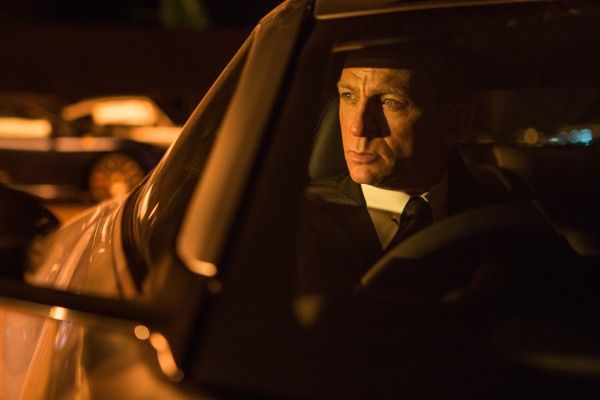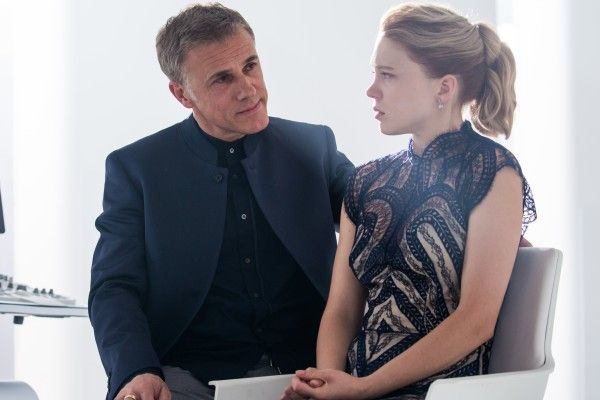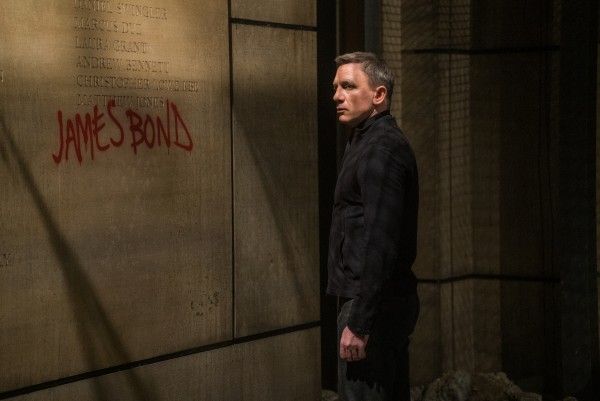[Spoilers for Spectre follow]
The conclusion to the latest James Bond film functions as both an ending and a beginning to the franchise. The movie leaves the ancillary characters—M (Ralph Fiennes), Q (Ben Whishaw), Moneypenny (Naomie Harris), and Blofeld (Christoph Waltz)—in place, but leaves Bond (Daniel Craig) free to ride off into the sunset. Spectre also rounds off the previous Craig pictures by noting that it was Blofeld and his shadowy organization that was behind Bond’s suffering in Casino Royale, Quantum of Solace, and Skyfall.
Outside of the films, you have Craig who publically stated he would rather slash his wrists than do another Bond movie, although he later walked those comments back and said he had a great time making Spectre. Nevertheless, the average timespan for a Bond actor is a decade, and Craig recently turned 47, so the stunts and action required is getting a little tougher, although that hasn’t stopped action star contemporaries like Tom Cruise (53) or Matt Damon (45) from going back to the spy-action genre.
The Bond franchise is still in its ongoing identity crisis, one that seemed solved by the end of Skyfall, but continues to loom large at the end of Spectre, which asks how the franchise can stay relevant in the 21st century while still carrying all the iconography that makes Bond distinctive. Casino Royale stripped everything away to make a more realistic Bond; Quantum tried to make its own Spectre and failed so it became a pointless entry in the series; Skyfall reintegrated and modernized the classic elements; and then Spectre misunderstood how to create effective callbacks, which sent Bond back into his old funk but with shinier, newer pieces.
Spectre inadvertently showed the way forward for the Bond franchise by showing what not to do. If Bond is going to survive among competitive spy franchises like Mission: Impossible and Bourne, then it needs to realize that what’s essential about Bond may not be what’s truly best for him. Giving people what they want—the gadgets, the cars, and girls—has not automatically made Bond a better franchise, and Spectre stops at the water’s edge in trying to push Bond forward as a character.
The film has a myriad of flaws, but its chief two are the Blofeld reveal and how it reinforces the series’ misogyny by creating another damsel in distress. The Blofeld reveal is the worst thing in blockbusters since Star Trek Into Darkness’ Khan reveal—two moments that are meaningless within the context of the film, and only have a brief metatextual thrill for the handful of people who can’t see them coming from a mile away. While Blofeld was at least more of a longterm nemesis to James Bond than Khan was to James Kirk, neither villain is relevant to his respective reboot. Their names precede them, but their actions on screen are next to nothing. Blofeld says he was the author of Bond’s pain, and we’re left to assume he used his massive Big Data engine in the desert to wreak havoc in Bond’s life.
This makes the conflict between Blofeld and Bond both personal yet oddly impersonal. They knew each other before the events of Spectre, and yet there’s no specificity to what Blofeld did. We don’t know how he set up Le Chiffre, and that’s because he never did. The Bond franchise needlessly retconned those elements just so they can get Blofeld’s name recognition in rather than provide some substantive motives for the character. Instead of good, old-fashioned world domination or a personal grudge extending to outside motives, Blofeld’s motives feel childish. He was scorned by Bond, and has dedicated his life to ruining 007’s, which could be an interesting idea if the movie really invested in it instead of saying “I’m responsible for all your pain, don’t ask how.”
Unlike Skyfall, which looked to the past and the future for the franchise, Spectre only looked at the past, but now James Bond finds himself at another crossroads. There are four Daniel Craig Bond films and they’re all reboots of sorts, and I expect Bond 25 will be along the same lines, sadly. Producers Barbara Broccoli and Michael G. Wilson are trying to lay out an exquisite corpse to keep the franchise alive, and so the events of individual Bond films can no longer happen in a vacuum. They have to be about mythology, and that mythology will likely lead us to a passing of the torch film.
To be fair to the producers, they’re only looking at the marketplace and trying to keep up. Studios see movies being treated like television, and Bond doesn’t get a pass because he’s over fifty years old. Bond doesn’t lend himself well to an expanded universe, but because people get so hung up on mythology and the need for everything to be “connected”, I expect Bond 25 will see the franchise get handed to a younger, hotter star—with or without Craig on hand to pass the torch.
But Bond faces a far deeper problem than who wears the tux and has the license to kill. For example, it’s time for Bond to grow up with regards to how it treats women, and while Moneypenny is a nice step forward, the notion of a “Bond girl” is hopelessly outdated. In Spectre, it wastes Monica Bellucci and it reinforces the damsel in distress stereotype at the end when Bond has to rescue Madeleine (Lea Seydoux) from a bomb. I don’t know if Bond needs to “settle down”, but perhaps its time to do away with love interests when we know by now that those love interests never come back for the following film and they’re certainly never depicted as Bond’s equal like we got earlier this year between Ethan Hunt and Ilsa Faust in Mission: Impossible – Rogue Nation.
The world still needs James Bond—we need him as an icon and as a refresher. For Bond going forward, he doesn’t need to imitate mythology-happy franchises. They don’t need to put television on the big screen. I don’t care about how Blofeld’s former stylist’s cousin factors into Bond’s past. Bond already sits at a strong middle ground between the other two major spy franchises—Mission: Impossible and Bourne. One is light, gadget-happy and requires a team dynamic and the other is deadly serious and goes solo. So let Bond wear his smile (we’re going to need a change from the dour Craig anyway), play his cheeky sense of humor without going camp, and be a solo man on a mission.
Bond doesn’t need to look to the past; he can breathe the past but be part of our present. It’s tougher for Bond, and shadowy organizations can feel outdated, but Bond needs to own its heritage going forward rather than show it off like prized antiques. Homage is fine, but Spectre shows that it can be a burden, and for Bond to live going forward, it’s time to embrace the pieces that are in play and stop imitating everyone else. There’s only one James Bond, so it’s time for this franchise to act like it.






